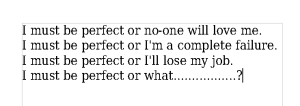I’ve been on Prozac for three weeks now, so I thought I’d report back on its effects, and also offer a bit of a forum:
Comment, if you want to, sharing what medication you’re currently on, or have been on, (doesn’t have to be anti-depressants) and the effects it’s having/had on your life and mood.
Basically, I don’t think people talk about this enough! So, yes, Prozac has been… great. Unexpectedly so. The awful recurring thoughts of badness have pretty much disappeared, and when they come are much MUCH less persistent and less potent. I’ve also generally been feeling pretty ok a lot more of the time – actually contented.
So far, side effects have been minimal, although I am feeling tired in the afternoons more. At the moment that’s ok – I can either have a caffeine overload on the days I’m at work, or have a nap (yay for being a student…), but that’s not really going to be possible when I’m (hopefully) working full time in about 2 months. Apparently Prozac side effects do decrease with time as your body gets used to it, so I’m well willing to give mine the next two months to find out, but if it doesn’t get any better I know I’ll have to make some hard choices.
It’s made me think about quite a few different things, too. I had a brief email conversation with Dr Ben Goldacre (of Guardian Bad Science column fame) about SSRIs, of which Prozac is one, which have been in the news recently. Studies have shown that for people with mild to moderate depression (I would class mine as moderate, as it’s not totally debilitating, but without drugs I am depressed, anxious and suffer upsetting thoughts every day for significant amounts of time) SSRIs were about as effective as placebos.
Obviously, this was shocking news for a lot of people, and various people on here talked about it. To put a different perspective on the issue, a friend of mine who is a psychology student at Sussex University rubbished the revelations, saying they’d only looked at surveys of patients up to one month after they started taking the drug, and that it normally takes longer than that for some people to feel the benefits.
Which, of course, led me to wonder – is Prozac having a real effect on me, or is it a placebo, and I’m effecting the change on myself? I suppose it’s unknowable. Medication for depression is often likened to using a sledgehammer to crack a nut, so delicate is the brain’s internal chemistry and so primitive is our knowledge of it. Yet I do feel better, even though I’m consciously aware of the findings of that study, so I think that’s really the only important thing to consider.
The other thing I’ve been struggling with is my personal history. I’ve been on anti-depressants before, during 2003-2004, in my first few terms at university. At the time, I made lots of new friends and was feeling happy and confident in my life. I remember that time as beautiful – full of drunken nights out, laughing endlessly with new mates and being amazingly, intellectually challenged. Up until now I’ve always thought of that time as a result of the circumstances of my life, not the citalopram, then escitalopram that I was on. But I’m being forced to reconsider, now, with the clear, obvious effects Prozac has had on me. It’s patent that my cynicism was, in some ways, unfounded, and that much of my general enjoyment of that time where I felt unanxious, free, fun loving and happy was down to the drugs. I’m not discounting the experience as helping – I’m sure being at uni for the first time had a big effect on my mood. But I’m also fairly certain the drugs had a big effect too.
I’ve recently started to realise, too, that I’ve been depressed, anxious and prone to upsetting thoughts for most of my life. I remember having them, and compulsively overeating, as young as five or six. They’ve never really stopped, or gone away, but have just been influenced by different things, such as grief or love. As such, I’m starting to wonder how long I will need to be on medication. For the rest of my life, perhaps? I’m still reeling from how much Prozac has helped me in what is really a very short time, and wondering how this year, last year, all the other years of upset and sadness and anxiety would have been different if I’d just been put on it sooner. I guess it’s unknowable, too.
Conclusions from all this soul searching aren’t easy to come by, except that I’m going to be far more tolerant of side effects this time. The escitalopram and citalopram I was on before made me drowsy every afternoon, so I was napping a lot and ending up sleeping for twelve to thirteen hours every day. At the time, unsure as to whether the drugs were really having any effect, I gave them up, reasoning that I needed to be awake more of the time so I could work better on my essays and reading. I spent my second year in a haze of extreme anxiety, deep depression and self harmed a lot. I also often got work in late and didn’t read enough, which, I am sure, contributed hugely to me getting a 2:1 instead of a 1st. I don’t want something like that to happen to me again, so I’m going to stick with these a bit longer, and see how it goes. I’ll report back, anyway.
So, what are your experiences?
Read Full Post »


